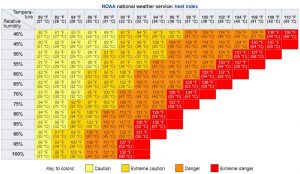Warm weather, sunny skies, and beautiful beaches; summer has come around once again, and with it, so has the heat. When heat rises and intense humidity levels accompany it, a great risk is imposed to older adults, children, and sick or overweight individuals. However, heat-related medical emergencies can happen to anyone, regardless of age, ethnicity, or overall wellness. Heat waves are the most lethal type of weather phenomenon in the United States; approximately 6,200 people are hospitalized and 400 people die annually from heat waves.
As temperatures soar, keep in mind that hot weather can have detrimental effects to your health. Heat cramps, heat exhaustion, and heat stroke can potentially lead to death. Our bodies regulate heat by sweating, but when heat and humidity levels are exceptionally high, our natural ability to sweat is hindered; the heat trapped inside of us, causing us to overheat, creates an extremely dangerous environment.
The heat index above showcases how heat and humidity work together to create a dangerous environment
Symptoms
If you or someone around you is experiencing symptoms of a heat-related illness, immediately contact emergency services. Minutes – even seconds – could be the difference between nursing someone back to health or them losing their life. Be sure to look for these signs in the people around you when the summer heat is especially high:
- Heat Cramps
- Muscle pains, muscle spasms, discomfort in the stomach, arms, or legs
- Heat Exhaustion
- Extreme sweating, paleness, muscle cramps, feeling weak or lethargic, headaches, nausea, dizziness, vomiting, or fainting
- Heat Stroke
- Hot, red skin; extremely high body temperatures, frequent fainting, weak pulse, rapid and shallow breathing, dizziness, confusion, or dry skin with no sweat
Tips and Advice
Review these safety tips and general advice to ensure the safety of you and those around you throughout these hot summer days. Remember that heat-related illnesses don’t happen immediately, but they can happen very quickly.
- Stay hydrated; drink plenty of fluids, and offer some to your friends or family around you
- Remember to eat full meals
- If you’re outside, seek shaded, cool areas, or spend short amounts of time directly in the sun
- Avoid strenuous activities that cause you to sweat/expend energy while in the heat
- Seek air conditioned homes, buildings, or facilities when possible
- Avoid relying on electric fans when the temperature is exceptionally high; fans can create a false sense of comfort that make you feel as though your body is cooler than it really is
- Wear lightweight, breathable clothing; dark-colored clothes absorb more heat, while lighter clothes reflect the sun
- Never leave people or pets in a car; temperatures in a closed car can raise over 20 degrees in less than 5 minutes
https://www.ready.gov/heat-toolkit


